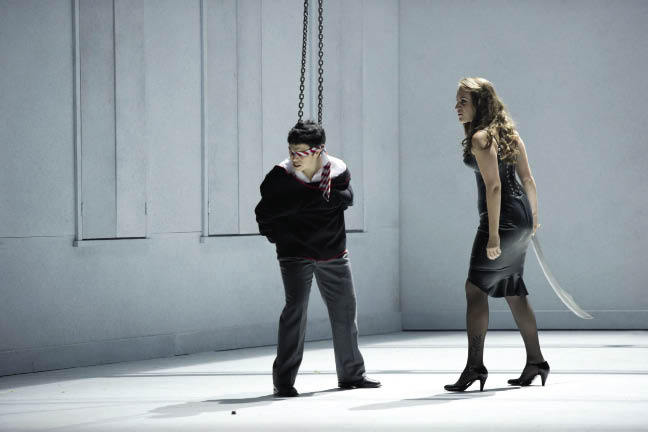Handel’s Rinaldo, the product of a composer of 25, we should remind ourselves, is not thought, nowadays, to be a masterpiece even by the most fervent Handelians, though when it was first produced in 1711 it was wildly successful, thanks to acres of coloratura and some very elaborate scenic effects.
Handel’s Rinaldo, the product of a composer of 25, we should remind ourselves, is not thought, nowadays, to be a masterpiece even by the most fervent Handelians, though when it was first produced in 1711 it was wildly successful, thanks to acres of coloratura and some very elaborate scenic effects. We no longer go to opera for the latter, and it’s a good thing we don’t, since we would rarely get much satisfaction — I dread the thought of directors getting bored with their present stock of clichés and turning once more to spectacle.
However, with the decline of ‘machines’ and so on has come a tendency to relocate Handel’s and other opera composers’ works in the present, for reasons I don’t understand. If audiences can’t take seriously dramas based on Tasso, which seems to be the underlying premise, what do they do when they read Tasso, or rather what would they do if they were to read Tasso? Why should dramas and operas need to be updated, while epic poems and novels don’t need to be — or is it a matter of time before we get round to that, too? Can we only learn from, find relevant, narratives and their characters which and who are contemporary with us? And if we can, hasn’t something gone even more wrong with our culture than many of us already realise?
There are degrees of outrageousness in updating, and Robert Carsen has opted for one close to the limit. He locates the drama, or rather dislocates it, in a school, the curtain rising on a classroom with a large blackboard, which in due course becomes a stage. The characters are dressed in traditional school uniforms, with the odd one wearing a gown and mortarboard. After a bit they put on armour, and take part in a send-up of Rinaldo. Some of it gets quite kinky, with the sorceress Armida, taken by Brenda Rae, as a leather-clad dominatrix, and a most convincing one — this must be an old-fashioned ‘enlightened’ school.
One of the many troubles with doing things this way is that though Handel undoubtedly mixes melancholy and mirth in Rinaldo, as he was to do with far more sophistication in later operas, it is hard for the melancholy to come across as that of one of the characters in the non-existent drama. The famous lament ‘Lascia ch’io pianga’, the first in Handel’s great series, seems to be merely an abstractly doleful piece, instead of one which affects our attitude to Almirena, Rinaldo’s beloved. By the time we reach Act III and have had the long interval, all pretence that this has much connection with Handel is dropped, and there is, indeed, a display, but a pyrotechnic one, which, since fireworks were apparently a novelty to most members of the audience, prompted roars of applause and laughter.
At least one couldn’t complain that a wonderful musical performance was being sabotaged by directorial larks, because the musical side was of a standard considerably inferior to what one expects at Glyndebourne. Ottavio Dantone, who conducted, with the Orchestra of the Age of Enlightenment in the pit, let the opera saunter along and, unusually for Glyndebourne, it ended later than advertised. Sonia Prina, in the title role, is a disappointment. Rinaldo is a man of greater resolution than she managed to suggest, and vocally she was ordinary; but no one was striking. Indeed, I have seen several Handel operas at the Royal College of Music which were not only more intelligently staged but also decidedly better sung than this.
The evening before I went to the Linbury Studio for Seven Angels, with music by Luke Bedford and words by Glyn Maxwell. It is an ambitious piece, and the Opera Group probably made as good a job of it as anyone would, though the proportion of words I was able to catch was low; but I think that that wasn’t the performers’ fault. The programme helpfully contained the full text, which I read a couple of times before the performance, but that didn’t help much since I’m not able to understand much of it; and it has a poetic texture which is exactly what a libretto doesn’t need. It is inspired by ‘Paradise Lost’, that recessive aspect of Milton’s poem which is concerned with the way we have spoiled the planet since the Fall. The seven angels of the title have fallen from heaven, find themselves in this despoiled world, and act out a drama to make sense of what has been going on. There is, as usual in this kind of thing, a tenuous hope at the end.
It does make for an exceptionally dreary evening, even by the standards of the Linbury dungeon. Though there are some interesting sounds, from both singers and players, nothing sticks in the mind, one concentrates too hard on what is supposed to be happening, and the overall worthiness of the work’s message becomes suffocating. It begins explosively, and hisses to a conclusion. The props are hundreds of books, many of which get torn up, a potent image of destruction, but only tangentially related to the opera’s basic subject.






Comments